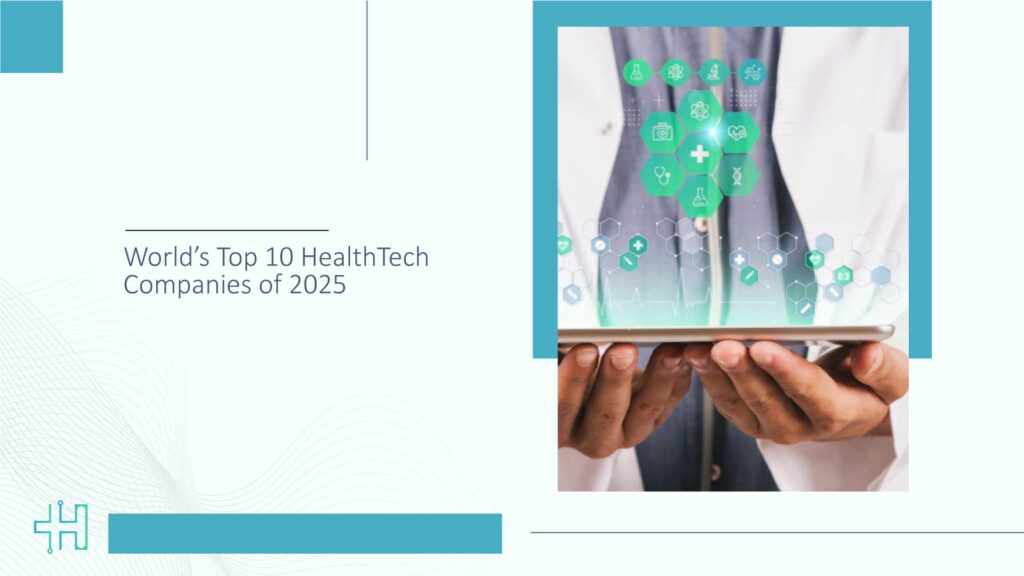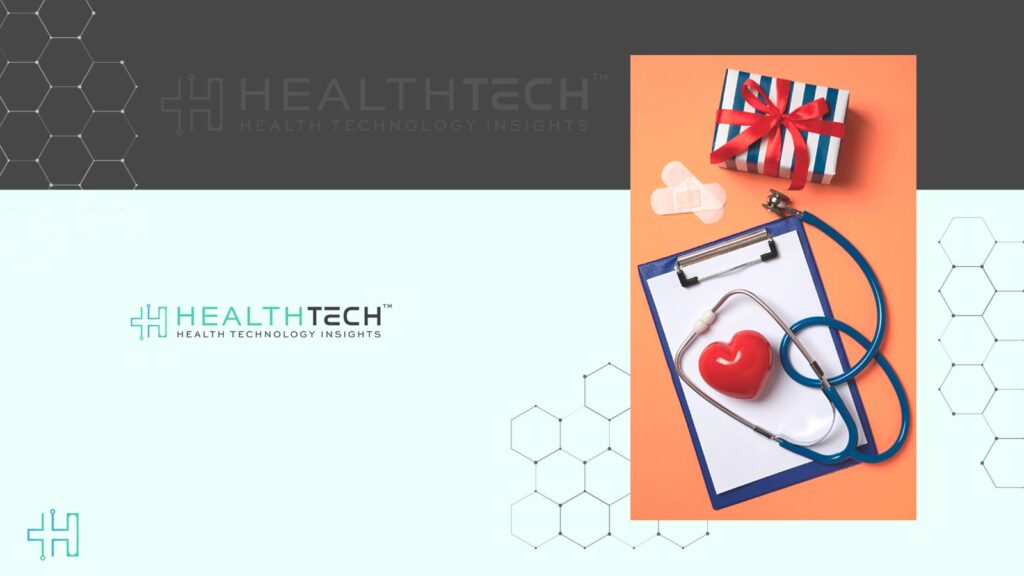Health care is evolving at an unprecedented speed, and those responsible for this revolution are the health technology innovators who are combining AI, data analytics, and clinical insight to make care more intelligent, quicker, and personalized.
The global HealthTech market is expected to exceed $870 billion in 2025, with the growth of AI-based healthcare solutions to be more than 40% per year. The range of technologies has advanced from predictive diagnostics to intelligent surgery planning, and now they are having a tremendous impact on the daily lives of people.
One way to understand this change is to see the World’s Top HealthTech Companies of 2025 as a major event in the healthcare revolution. Those companies leading the way in medical AI, digital care, and health data optimization were the ones TIME most acknowledged. Here is a glance at those “Outstanding” ten companies that are the real movers behind the smart and data-powered future of health care.
1. AdviNOW Medical (United States)
AdviNOW Medical is changing the whole game of patients’ easy access to care through virtual triage and diagnosis powered by AI. To be specific, the said platform employs computer vision and machine learning technologies to not only gather patient data but also to simplify clinical documentation and guide patients through the whole care cycle – starting from symptom input and ending with treatment recommendation.
Coming to the point, in 2025, AdviNOW’s platform is the driving force behind telemedicine and urgent care networks across the country, which in turn has resulted in the reduction of waiting time by as much as 70% and a cut in administrative costs. It is one of the best instances where AI can help in patient flow management, and simultaneously, clinicians can regain their time for the next human interaction, which is the real care.
2. Commure (United States)
One of the quickest desirable in AI-driven hospital operations is Commure. Their smart health-tech infrastructure platform enables the flow of data from electronic health records (EHRs), billing, and clinical systems, unblocking the processes and enabling better decision-making.
Commure’s impact stayed broad and large after its confluence with Athelas. Now, it can aid the extensive American health systems with the use of predictive analytics by locating the provision of care barriers, and the best way to allocate resources, therefore making the hospital accomplish better performance, while increasing positive patient outcomes.
3. Cohere Health (United States)
Cohere Health’s mission is to make healthcare authorization simple and intelligent. Using AI and natural language processing, it streamlines the prior authorization process that often delays patient care.
In 2025, Cohere processes millions of clinical requests monthly for insurers and providers nationwide. Its system reduces administrative delays by nearly 60%, enabling doctors to focus more on patients rather than paperwork – a huge win for care coordination.
4. Caresyntax (United States)
Caresyntax is transforming surgical workflows with its data-driven surgical intelligence that impacts the planning, performing, and analyzing phases of the surgery. Their software collects and links data from video, sensors, and performance to assist hospitals in outcome evaluation and risk reduction in surgeries.
As per projections, Caresyntax technologies will be installed in more than 15,000 operating rooms globally by 2025. Hospitals are experiencing a decline in complications following surgeries as well as an increase in the quality of surgical training, thus verifying the efficacy of timely and accurate data in both saving lives and cutting expenses.
5. BC Platforms (Switzerland)
BC Platforms is at the forefront of the worldwide change that involves the integration of genomic and clinical data. The company’s protected data networks connect healthcare providers and investigators to the vast genomic datasets that are becoming increasingly valuable for clinical use.
In the year 2025, BC Platforms collaborates with the world’s leading pharmaceutical companies and hospital networks to facilitate the development of personalized medicine. The company’s data-sharing model is the main driver for rapid drug discovery as well as the provision of individualized therapies by doctors.
6. Fabric (United States)
Fabric, previously Wheel Health, builds the next generation of digital care infrastructure. With its AI-empowered platform, the company can roll out telehealth, remote monitoring, and hybrid care programs efficiently.
More than 100 million virtual visits per year are facilitated by Fabric’s platform. Patients can access health care providers who are qualified and registered anywhere in the U.S. through Fabric. The healthcare systems that are eager to update the way they deliver care have welcomed the adaptable APIs and the various automations as their new best friend.
7. CorroHealth (United States)
CorroHealth marries human knowledge alongside artificial intelligence to revamp medical coding, the revenue cycle, and compliance. Their smart automation tools enable healthcare organizations to get money that they have given away without realizing that they have lost, and also to minimize the part of the coding that are errors.
By the time it gets to 2025, CorroHealth is collaborating with several major hospital networks as well as large payers situated in different parts of the United States. The company’s systems powered by AI take on the task of handling claims worth billions of dollars every year – this not only facilitates the provision of the results but also makes sure that healthcare providers get their money at the right time and in the right amount.
8. CorVista Health (United States)
CorVista Health is creating revolutionary non-invasive diagnostics that use AI and advanced signal processing to detect cardiovascular disease. Its FDA-cleared CorVista® System, which is radiation and contrast-agent-free, delivers cardiac signal analyses in just a few minutes.
By 2025, the company’s platform will be deployed in clinics across the country to detect coronary artery disease at an early stage. The combination of its speed and accuracy enables doctors to find heart diseases in a shorter time, which in turn can save many lives by timely treatment.
9. Artemis Health (United States)
Artemis Health offers healthcare employers and benefits leaders the power of making more informed decisions through data analytics and visualization. Its platform integrates medical, pharmacy, and wellness data, which in turn uncovers trends and manages costs.
In the year 2025, Artemis will continue to be the partner of hundreds of large employers and benefit advisors, whom she supports in achieving better employee health outcomes while managing rising healthcare costs. The company’s turning-point insights are instrumental in setting the new standard for transparency of data in employee health management.
10. Enhatch (United States)
Enhatch is utilizing AI technology to revolutionize orthopedic surgeries through their Intelligent Surgery Ecosystem™, which integrates predictive modeling to enhance surgical planning and patient-specific implant creation.
The software of Enhatch helps the surgeon in making 3D models that are patient-specific, along with the surgical plans. In 2025, the operations as a result of this planning are faster and less time-consuming, and the patients recover quickly. Through collaborations with the foremost manufacturers of medical devices, the company portrays how radical change and partnership can propel the universe of surgery to new heights.
Other Notable HealthTech Innovators in 2025
Beyond the top 10, many other HealthTech innovators develop cutting-edge AI and data analytics applications that radically change the ways in which care is delivered, measured, and personalized. Some of the Outstanding performers acknowledged are:
Florence Healthcare, enabling clinical trial workflows via digital document automation; IQVIA, the data angel that accurately combines AI and real-world evidence to speed up medical research; K4Connect, which is creating smart-living platforms for the elderly; and Komodo Health, which is employing real-world data to chart patient journeys and optimize population health.
While others like NeuroFlow concern themselves with behavioral health analytics, Nym Health uses AI-powered natural language understanding to automate clinical documentation. Premier utilizes analytics to uncover hidden hospital performance potential, and Reveleer simplifies quality reporting for payers and providers. The stillness of pioneers in precision medicine, such as Tempus, continues to be felt by the AI industry, as it sets the bar high for AI-genomic and clinical data integration.
TIME has also recognized a new band of Very High-performing HealthTech companies like Abridge (clinical note automation), Aetion (real-world evidence analytics), AITRICS (AI diagnostics from South Korea), and Bamboo Health (care coordination intelligence). Blueprint, Centauri Health Solutions, and Clarify Health are using predictive insights to make healthcare delivery more efficient.
Meanwhile, Clearsense fosters data governance, and Cleerly makes advancements in heart disease detection through AI imaging. ClosedLoop identifies resources for risk prediction, and ConcertAI facilitates speedier, data-driven cancer research.
One is forced to agree with these innovators that the 2025 landscape still holds a myriad of companies that reinvent the healthcare industry – a fact that is evident from the trends in predictive analytics to patient engagement, which the HealthTech revolution is global, diverse, and accelerating fast.
FAQs
1. What is HealthTech?
HealthTech is a form of technology that employs digital innovations such as AI, the Internet of Medical Things (IoMT), and software analytics to improve patient care, diagnostics, and healthcare delivery efficacy, and personalization.
2. How were the top HealthTech companies of 2025 selected?
This group was featured in TIME’s Top World HealthTech Companies 2025 ranking, which considered a range of criteria including the companies’ innovations, market growth, funding, and positive influence on global health situations.
3. Which HealthTech company is growing the fastest in 2025?
Oura Health is the ruler of wearable health tech, where it reached a valuation of $11 billion in 2025, and is swiftly broadening its reach into new areas such as mental health and fitness monitoring.
4. What are some upcoming trends in HealthTech for 2025?
The main trends for 2025 are AI-driven diagnostics, voice-centric health profiles, virtual menopause and mental health, and wearables that can monitor biomarkers continuously.
5. Which startup should investors watch in the HealthTech space?
Qure.ai and VideaHealth are the bright new startups. The former utilizes AI to diagnose diseases at an early stage, and the latter supports clinicians by providing quick and accurate clinical insights.
Keep reading on Health Technology Insights.
To participate in our interviews, please write to our HealthTech Media Room at sudipto@intentamplify.com




